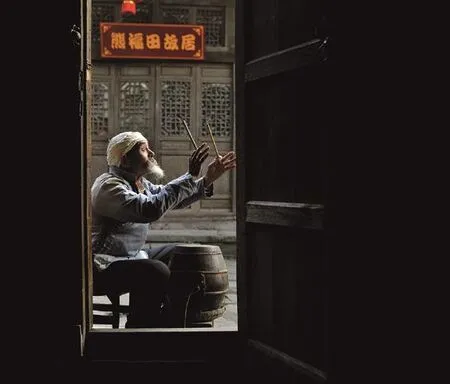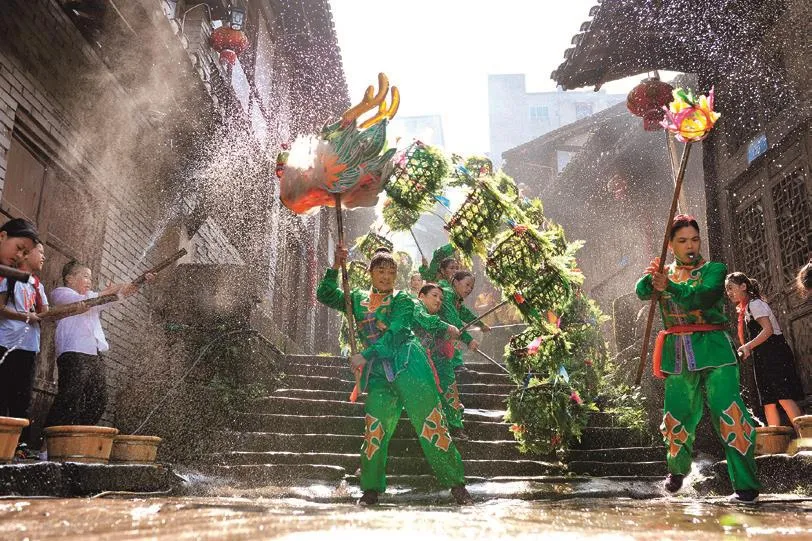西沱:穿越千年的风云传奇
2018-11-21
◇ 文|本刊记者 图|

与大多数长江边上沿江平行而建的古镇不同,石柱的西沱古镇显得有点“另类”——唯一与长江形成垂直布局。西沱原名“西界沱”,这个占据着水路交通先天优势的地方,似乎一出世就已决定了它将是一个商业重镇。
早在秦汉时期,西沱就已经因盐而成为川东地区重要的商业重镇。上世纪七八十年代,每逢赶场天,西沱总是摩肩接踵。
穿越千年,西沱古镇由盛转衰,又于当下涅槃。古镇游的兴起,正吸引着越来越多的游客,再度向古镇聚拢。
Unlike most of ancient towns parallel to the Yangtze River, Xituo Town seems a bit "alternative"being vertically built along the river. Xituo was originally called "Xijietuo". The place occupying the natural advantage of waterway transportation was predestined to be an important commercial town.
As early as in Qin and Han Dynasties, Xituo Town has been dominant in commerce in the east of Sichuan Province depending on its salt resources. In the 1970s and 1980s, the town was always in hustle and bustle when it came to the market day.
After thousands of years, Xituo Town experienced both prosperity and decline. It is prosperous again today. With the rise of tourism wave of ancient towns, more and more tourists are being attracted to come to Xituo Town.
因盐而生的货物周转中心
Turnover Center of Salt
上午的太阳已明晃晃地眷顾了西沱古镇。我们沿着西沱古镇的云梯街拾级而上,两旁的老旧建筑静静地立着。在幽深的云梯街某个拐角处,一队“背脚子”迎面而来。
谭碧祥就走在队伍中间。
这自然不是当年真实场景,却真实还原了历史深处的某一段风云。盐运背景下诞生的特殊角色“背脚子”,当下成为西沱古镇向游客展示的一个项目。
现在的云梯街,曾是“背脚子”们背着盐前往湖北湖南的必经之路。云梯街上,历经千年岁月打磨的青石板,棱角已经被打磨得格外圆润,依山而建的当地民居,层层叠叠向上延伸。想象一下雨天,当淅沥沥的小雨打在青石板上,远处青山如黛,近处水滴落到石板上的凹痕里,传来啪啪声响,那是一种典型的中式水墨意境。
提到这些凹痕,就不得不提西沱商业繁荣的另一个重要因素,盐。忠县、巫山、巫溪一带,自古便是井盐的生产重地。民国时期,仅这三地便有盐井四百余口。古时,这一地区盐井所产出的盐,大多便是通过西沱向外运输。
当盐通过水路运到西沱码头后,即改为陆路,用肩挑背扛的方式向外运输。因此,西沱古镇上也诞生了一项古镇上特有的、传承千年的职业“背脚子”。云梯街上那些凹痕,便来自于千百年来“背脚子”们歇脚时,用手杖支撑、常年累月杵出的痕迹。
过去,一名“背脚子”启程后,至少要背上120斤以上的盐,行走33天,往返于湖南与西沱两地。返程时,又需要将山羊皮、桐油、药材等背回西沱。商贩则会将“背脚子”带回的山货、桐油、药材等货物,通过水路贩卖到长江上游地区。
由于西沱码头上商旅往来频繁,与人们衣食住行息息相关的诸如茶水铺、客栈、饭馆、药铺等等商业业态,便开始在这里聚集。据当地县志记载,西沱一带,曾有店铺三百多家。
The ancient town is shiny in the morning sun.We went up the Yunti Stairs and old buildings stand quietly on both sides. At the deep corner of the Yunti Stairs, a line of “carriers” can be seen.
Tan Bixiang was among them.
It is sure not the real scene of that year, but it restores a certain period of history. It was a special group of "carrier" in the background of salt carrying,which has been an attraction that tourists would be introduced.
The Yunti Stairs were the only way for the"carriers" to carry salt to Hubei and Hunan Provinces.The edges and corners of the bluestones have been polished particularly round after thousands of years,and local dwellings, extending upward with layers, are at the foot of the hills. A picture of typical Chinese ink could be imagined: in a rainy day, the green hills in the distance are bathed in dark, and the nearby water drops sound pattering dripping into the dents of the bluestones.



The mention of these dents reminds people of salt,another important factor leading to the commercial prosperity of Xituo Town. Zhongxian County, Wushan Mountain, and Wuxi County have been important production areas of Jingyan County since the ancient times. In the period of the Republic of China, there existed over four hundred salt wells in these three places. In the ancient times, well salts produced in this region were largely transported to other places through Xituo.
After the salts were transported by water to the Xituo Wharf, landway was then adopted for further transportation by shoulder and back. Therefore, a peculiar occupation of labor transportation of the "carrier" was born and passed down from generation to generation. Those dents were left by the "carriers" from generation to generation when they rested by sticking canes to the bluestones.
In the past, a "carrier" walked between Hunan Province and Xituo Town with at least 60 kilograms salts for 33 days. Goatskins, tung oils, herbs were carried by them to come back to Xituo. Merchants would sell these goods brought by the "carriers"to the upper reaches of the Yangtze River through waterway.
Due to the frequent business communication in the Xituo Wharf, commercial activities such as tea shops, inns, restaurants, and pharmacies began to gather here. According to local county records, there were more than 300 shops in the Xituo area in that time.
古老商业街上生活往事
Life on the Old Commercial Street
至今,当地人还清楚记得这句话:谭家的银子,杨家的顶子,黄家的锭子(拳头),都比不过熊家的药铺子。
这是对当年西沱古镇形态的最好描述。谭家人擅长经商,古镇上德盛强、永贸强、永城商号等商铺,都是谭家人的产业。杨家人以子嗣中做官的多而闻名,码头附近的下盐店便是当年杨氏家族的住宅。黄家人子嗣众多,“人多”自然“势众”,打架斗狠谁也敌不过。最为出名的还要数在西沱镇上做药材生意的熊家,熊家主人熊福田早年留学日本,学过西医,是古镇上最早的中西医结合医生。
当年的古镇上,商业竞争相当激烈。码头的繁荣,让各地客商在此云集,商会也随之出现。二圣宫便是当年山东商人与山西商人合建的会馆,里面同时供奉着孔子与关羽。现在二圣宫门口的一对石狮上,还能看出端倪,两只石狮的头,分别向着山东和山西方向。
古镇上有一处单独的关帝庙,实际上是因为后期山西商人实力变强,单独另立会馆。古镇上的禹王宫,是当年湖广一带商人的会馆。紫云宫处,曾有秦良玉行宫,更多为当地人祭祀。而万天宫,则是当年四川人的会馆。
以前的西沱,谁掌握了码头,谁就拥有话语权,使用码头难免有纷争,此时便是袍哥上场的时候。据当地乡民的说法,最初码头为杨家人所建,后来谭家人因为各种纠纷,也立志建自家码头,最后终于达成所愿,在杨家的码头上游,又建起了一座码头。
自古以来,古镇上往来交流的,除了货物还有文化。在水路交通占据绝对优势的很长一段时间里,古镇一直是时尚的弄潮儿。古镇居民回忆,上世纪八十年代初,很多人还不知邓丽君时,古镇人就已经在船员的带领下,哼起了邓丽君的歌,也穿起了花衬衫。
Up to now, the locals still say that the drug store of the Xiong family dwarfs the money of the Tan family, officials of the Yang family and fists of the Huang family.
which best described Xituo Town in that time.The Tan family was good at business, and the shops such as Deshengqiang, Yongmaoqiang, and Yongchengshanghao all belonged to the Tan family.The Yang family was well-known for having many officials, the Xiayan Shop near the wharf was the family's residence. Members of the Huang family were so numerous that whoever couldn't win them in fights, because just as a Chinese idiom says that many hands provide great strength. However, the Xiong family operating medicine business were particularly famous. The family owner Xiong Futian once studied in Japan and studied western medicine. He was the town's first doctor to combine traditional Chinese medicine with western medicine.
Business competition was fierce in this old town.The prosperity of the wharf attracted business men from various places, which directly started chambers of commerce. The Holy Palace was jointly built by merchants from Shandong and Shanxi provinces, in which Confucius and Guan Yu were enshrined. We can still see some clues from the pair of stone lions at the entrance of the palace, they turned to the direction of Shandong and Shanxi respectively.
The separate Guandi Temple actually was for Shanxi merchants after they became much strong later. Yuwang Palace was the assembly hall for the merchants in the area of Hunan and Hubei Provinces.There was Qin Liangyu Palace in Ziyun Palace, which was for worships for the locals. And Wantian Palace was the assembly hall of Sichuan people.
In the past time, whoever mastering the dock had the speak power. Therefore disputes were inevitable, which was often mediated by Paoge (a folk organization). According to local people, the initial wharf was built by the Yang family. And various disputes stimulated the Tan family to construct its own one. So a new dock was then built in the upper reaches of the Yang family's.
Since ancient times, cultural exchanges were also popular in the ancient town in addition to goods. For a long time of waterway transportation being dominant,the ancient town was at the forefront of the fashion.The residents recalled that boatmen had taught them to sing the songs of Teresa Teng who was known by rare people in the early 1980s. And flowery shirts had also been introduced to the ancient town at that time.

千年古镇重获新生
The Renaissance of the Thousands-year-old Town
随着交通条件的改变,“背脚子”这一盐运孕育出的特殊工种,早已消失在历史长河中。
然而,背夫号子沉寂数十年后,再度在古镇曲折幽深的云梯街响起。
如今,“背脚子”成了古镇上一支特殊的演出队伍,队长便是祖上两代人以“背脚子”为生的彭家胜。“背脚子”的表演者们翻出了父辈的服饰,背上当地独有的背盐工具扁背,还着马灯。他们穿行在青石板铺就的云梯街上,吼起久违的背夫号子,带着游客一起穿越千年风云。
目前,西沱古镇在保护传统文物、保持民居原始风貌基础上,对古镇建筑进行修复。据说,云梯街将在今年10月开街。届时,二圣宫的戏台上,锣鼓将再度敲响,川剧、土家傩戏等,都将轮番上阵。
古镇上丰富的文化交流,将立春打春牛这一习俗演变成了玩牛。与舞狮有些类似,人们披着“牛皮”,模仿着牛在田间的各种姿态。未来,西沱还准备成立全国玩牛联盟,举办全国玩牛大赛。
由于运盐这一特殊的背景,古镇上历来就少不了盐帮,也孕育出不少民俗活动。过去每逢端午、龙抬头等节日,每个盐帮都会组织自己的舞龙队伍,进行舞龙比赛,沿途居民参与其中,不断向巨龙泼水。目前,古镇上的舞龙队伍也已重新组建完成,巨龙沿着古镇云梯街而行,舞出各种花样,游客还可以参与到泼水的互动中来。
穿越千年的江边古镇,正在涅槃。
The development of transportation mode has replaced the means of the "carrier".
However, the work song is played again in the winding and deep Yunti Stairs after decades of silence.
Today, a special performance team of the"carrier" is organized to commemorate those labors depending on their back and feet. The team leader is Peng Jiasheng whose ancestors for two generations once lived their lives as "carrier". The performers of"carrier" wear the clothes of their ancestors, carry the unique local tools for salt, and take the lanterns. They perform on the Yunti Stairs paved with bluestones singing the work song. Tourists are taken back to the history.
At present, Xituo Town is in the restoration on the basis of protecting traditional cultural relics and maintaining its original features. Accordingly, Yunti Stairs will be opened to tourists in October this year.At that time, on the stage of Ersheng Palace, gongs and drums, the Sichuan Opera, and Tujia Opera will be shown.
The rich cultural exchanges in the ancient town have developed the custom of whipping cattle on the Start of Spring into imitating cattle. Similar to lion dance, people wear "cattlehide" imitating various postures of cattle working in the field. Xituo Town intends to set up national cattle performing alliance and held competition in the future.
The special background of transporting salts gave birth to certain organizations and many folk activities.In the past, they would organize their own teams for dragon dance on every Dragon Boat Festival,Dragon Heads-raising Day, etc.. Residents nearby would participate in it and constantly splash water to the giant "dragon". So for the work of regrouping the dragon dance team has been completed. The giant"dragon" walked through the Yunti Stairs and danced out a variety of tricks. Tourists are allowed to interact by splashing.
The ancient town with a history of thousands of years is rallying to boom.

